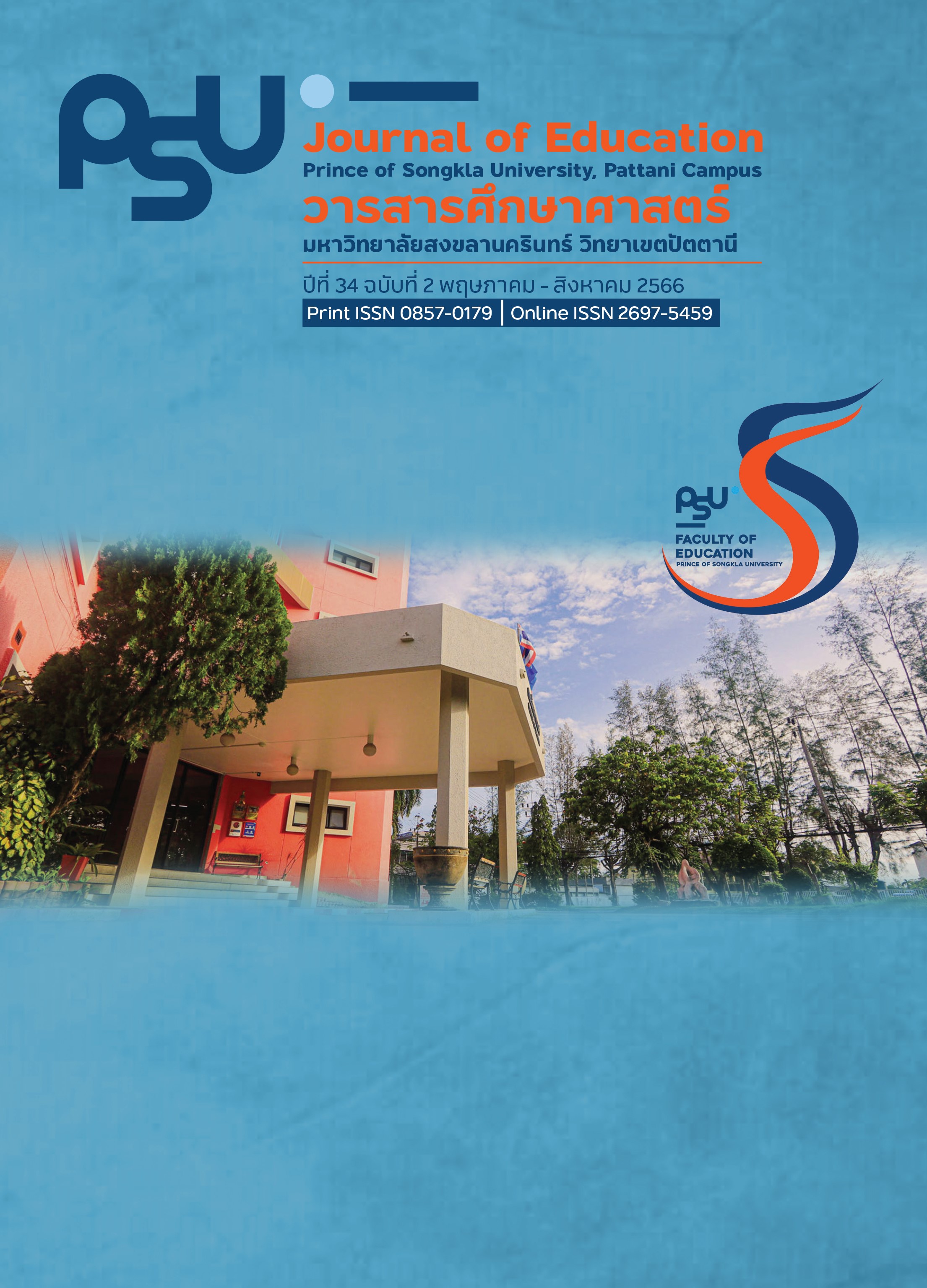ปัจจัยที่ส่งผลต่อการยอมรับเทคโนโลยีการเขียนโปรแกรมแบบบล็อกคำสั่ง (Block based programming) ในโรงเรียนไทย
Main Article Content
บทคัดย่อ
งานวิจัยนี้มีวัตถุประสงค์เพื่อศึกษาปัจจัยที่ส่งผลต่อการยอมรับเทคโนโลยีการเขียนโปรแกรมแบบบล็อกคำสั่ง
(Block based programming) ในโรงเรียนไทย การวิจัยนี้เป็นงานวิจัยเชิงปริมาณ เก็บรวบรวมข้อมูลโดยใช้แบบสอบถามเป็นเครื่องมือ โดยเก็บข้อมูลจากกลุ่มตัวอย่างจำนวน 500 ตัวอย่าง จากครูที่สอนวิชาวิทยาการคำนวณและเคยนำเทคโนโลยีการเขียนโปรแกรมแบบบล็อกคำสั่งมาใช้ในการเรียนการสอน และสามารถเก็บข้อมูลได้ จำนวน 458 ตัวอย่าง หรือคิดเป็นร้อยละ 91 และทำการวิเคราะห์ข้อมูลโดยใช้เทคนิคการวิเคราะห์โมเดลสมการโครงสร้าง (Structural Equation Model: SEM) ผลการวิจัยพบว่าปัจจัยด้านการรับรู้การใช้งานง่ายและปัจจัยด้านการรับรู้ประโยชน์ร่วมกัน ส่งผลต่อการยอมรับเทคโนโลยีที่ร้อยละ 42 โดยปัจจัยด้านการรับรู้ถึงความง่ายในการใช้งานมีอิทธิพลมากที่สุด ทั้งนี้ มี 3 ปัจจัยที่ร่วมกันส่งผลต่อปัจจัยด้านการรับรู้ถึงความง่าย ได้แก่ ปัจจัยด้านอิทธิพลทางสังคม ปัจจัยด้านการสนับสนุนจากสถานศึกษา และปัจจัยด้านการสนับสนุนจากภาครัฐ แต่ปัจจัยด้านความรู้ในเนื้อหาผนวกวิธีสอนและเทคโนโลยี (TPACK) ไม่ส่งผลต่อการรับรู้ถึงความง่าย ผลการวิจัยในครั้งนี้สามารถใช้เป็นแนวทางให้กับหน่วยงานที่เกี่ยวข้องกับการศึกษาในการนำไปพัฒนาให้เกิดการนำเทคโนโลยีการเขียนโปรแกรมแบบบล็อกคำสั่งไปใช้ในการสอนอย่างต่อเนื่อง
Article Details

อนุญาตภายใต้เงื่อนไข Creative Commons Attribution-NonCommercial 4.0 International License.
เอกสารอ้างอิง
Alsofyani, M.M., Aris, B., Eynon, R., & Majid, N.A. (2012). A preliminary evaluation of short blended online training workshop for TPACK development using technology acceptance model. Turkish online Journal of Educational Technology, 11(30), 20-32.
Almeida, A., & et al. (2016), Exploring the gating mechanisms of aquaporin-3: new clues for the design of inhibitors?, MolBiosyst, 12(5), 1564-73. https://doi.org/10.1039/C6MB00013D
Baturay, M. H., Gökçearslan, Ş., & Ke, F. (2017), The relationship among pre-service teachers’ computer competence, attitude towards computer-assisted education, and intention oftechnology acceptance, International Journal of Technology Enhanced Learning, 9(1), 1-13. https://10.1504/IJTEL.2017.10003119
Begosso, L. C., Bcgosso, L.R., & Christ, N.A. (2020). An analysis of block-based programming environments for CS1. IEEE Frontiers in Education Conference (FIE). IEEE.
Birkollu, S. S, & et al. (2017). Investigating the Attitudes of Pre-service Teachers Towards Technology Based on Various Variables, 6(3), 578-583. https://dx.doi.org/10.18421/TEM63-20
Bourgonjon, J., De Grove F., De Smet, C., Looy, J.V., Soetaert, R., Valcke, M. (2013). Acceptance of game-based learning by secondary school teachers. Computers & Education, 67, 21-35.
Çevik, M. & Bakioğlu, B. (2021), Investigating students’ E-Learning attitudes in times of crisis (COVID-19 pandemic). EducInf Technol(Dordr), 2021(2), 1–23. https://doi.org/10.1007/s10639-021-10591-3
Chavoshi, A. & Hamidi, H. (2019). Social, individual, technological and pedagogical factors influencing mobile learning acceptance in higher education: A case from Iran. Telematics and Informatics, 38(2019), 133-165. https://doi.org/10.1016/j.tele.2018.09.007
Davis, F. D. (1989), Perceived Usefulness, Perceived Ease of Use, and End User Acceptance of Information Technology, MIS Quarterly, 13(1989), 318-339.
Digital Economy Promotion Agency (2020). Promoting learning and developing coding skills. https://www.depa.or.th/th/skill-coding
Dubey, P., & Sahu, K. K. (2021). Students’ perceived benefits, adoption intention and satisfaction to technology-enhanced learning: examining the relationships, Journal of Research in Innovative Teaching & Learning, 10(1), 2397-7604. https://doi.org/10.1108/JRIT-01-2021-0008
Elkaseh, A.M., & Wong, K.W. & Fung, C.C. (2016). Perceived Ease of Use and Perceived Usefulness of Social Media for e-Learning in Libyan Higher Education: A Structural Equation Modeling Analysis. International Journal of Information and Education Technology, 6(3), 192-199. https://10.7763/IJIET.2016.V6.683
Gary, C. C. (2019). Exploring factors influencing the acceptance of visual programming environment among boys and girls in primary schools., Computers in Human Behavior, 92 (2019), 361-372. https://doi.org/10.1016/j.chb.2018.11.043
Graf-Vlachy L., Buhtz K., & König A. (2018). Social influence in technology adoption: taking stock and moving forward. Management Review Quarterly, 68(2018), 37–76. https://doi.org/10.1007/s11301-017-0133-3
Guzmán, D. B. (2019). Technology Integration for the Professional Development of English Teachers. Journal of Universidad Pedagógica Nacional, 46(2019). 157-168. https://10.17227/ted.num46-10545
Hsiao, K., & et al., (2017). Exploring the effect of compulsive social app usage on technostress and academic performance: Perspectives from personality traits. Telematics and Informatics, 34(2) 679-690. https://doi.org/10.1016/j.tele.2016.11.001
Huang, V.N.& Hong, Z.R. (2016). The Effect of Flippe English classroom intervention on studens' information and communication technogy and English reading comprehension. Educational Technology Research and Development, 64(2). 175-193.
Khongmalai, O. & Distanont, A. (2018). Research Techningves in Technology and Innovation Management. Thammasat University Publisher.
Koehler, M.J., & Mijhra, P. (2008). Introducing Technological Pedagogical Content khowledge. Introducing Technological Pedagogical Content khowledge. In AACTE Committee on Innovation and Technology (Eds.), Handbook of Technological Pedagogical Content knowledgc (TPCK) for Educators (pp. 3-29). New York: Routledge.
Lai, H.H. & Chen, C.P. (2011) Factors influencing secondary School tcachers' adoption of teaching blogs. Computers & Education, 56(4), 948-960.
Leong & et al,. (2018), ARID5B as a critical downstream target of the TAL1 complex that activates the oncogenic transcriptional program and promotes T-cell leukemogenesis, Genes & Development, 31(23-24) 2343-2360. https://doi.org/10.1182/blood.2018874503
Lindeman, R.H., Merenda, P.F., & Gold, R.Z. (1980). Introduction to Bivariate and Multivariate Analysis. Glendview, IL: Scott, Foresman and Company.
Maeng, J.L., Mulvey, B.K., Smetana, L.K & Bell, R.L. (2013). Preservice Teachers' TPACK: Using Technology to support Inquiry Instruction. Journal of Science Education and Technology, 22(6), 838-857.
Ministry of Education. (2017). The Educational Development Plan of Ministry of Education. https://inspec.moe.go.th/wp-content/uploads/2022/11/MOE-Plan-Edu-60-64-เล่มแผนพัฒนาการศึกษาของกระทรวงศึกษาธิการ-ฉบับที่-12-พ.ศ.-2560-2564-.pdf [in Thai]
Mishra, P. & Koehler, M. (2006). Technological Pedagogical Content Knowledge: A Framework for Teacher Knowledge. Teachers. College Record, 108, 1017-1054.
OECD. (2018), Coding, Programming and the Changing Curriculum for Computing i n Schools. Report of UNESCO/IFIP TC3 Meeting at OCCE 2018, https://www.ifiptc3.org/app/download/ 7193549351/OCCE+2018+TC3+UNESCO+meeting+040219+CS+coding.pdf
Parkman, S., Litz, D., & Gromik, N. (2018), Examining pre-service teachers’ acceptance of technology-rich learning environments: A UAE case study, Education and Information Technologies, 23(3), 1253-1275. https://doi.org/10.1007/s10639-017-9665-3
Piedade, J., Dorotea, N., Sampaio, F., & Pedro, A. (2020). On Teaching Programming Fundamentals and Computational Thinking with Educational Robotics: A didactic Experience with Pre-Service Teachers. Education Science, 10(9). 214.
Taherdoost H. (2017), A review of technology acceptance and adoption models and theorie. 11th International Conference Interdisciplinarity in Engineering, INTER-ENG 2017, 5-6 October 2017, Tirgu-Mures, Romania. Procedia Manufacturing, 22(2018), 960–967. https://10.1016/j.promfg.2018.03.137
Tanak, A., (2020). Designing TPACK-based course for preparing student teachers toteach science with technological pedagogical content knowledge. Kasetsart Journal of Social Sciences, 41(2020), 53–59. [in Thai]
Thammaprateep. J. (2016). Developing Technological Pedagogical Content Khowledge in science Teaching. Journal of Research and Curriculum Development, 6(2), 1-13. [in Thai]
Tondeur. J., Ronny, S., Siddiq, F., & Baran, E. (2017). A Comprehensive investigation of TPACK within pre-service teachers' ICT profiles: Mind the gap!. Australasian Journal of Educational Technology, 33(3), 46-60. Doi: 10.14742/ajet.3504
Srisumaung, E., Phookung, K., & Nuysud, M, (2515). Model of Parental Participation in Developing the Learning and Teaching Processes of students for Pratom La-or Utit Demonstration School Suan Dusit Rajabhat University. Journal of Multidisciplinary in Social Science, 11(2), 163-178. [in Thai]
Venkatesh, V. & Davis, F.D. (2000). A Theoretical Extension of the Technology Acceptance Model: Four Longitudinal Field Studies. Management Science, 46(2), 186-204. https://doi.org/10.1287/mnsc.46.2.186.11926
Zhao, Y., Yong Pugh, K.J., Steven, S.B., & Byers, J. (2002). Conditions for Classroom Technology Innovations. Teachers College Record, 104(3), 482-515.


